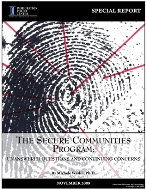 The Secure Communities program, which launched in March 2008, has become a centerpiece of immigration enforcement efforts by Immigration and Customs Enforcement (ICE). Its rapid expansion coupled with serious concerns about the design, goals, and implementation of the program has resulted in a great deal of controversy.
The Secure Communities program, which launched in March 2008, has become a centerpiece of immigration enforcement efforts by Immigration and Customs Enforcement (ICE). Its rapid expansion coupled with serious concerns about the design, goals, and implementation of the program has resulted in a great deal of controversy.
Under Secure Communities, participating jurisdictions submit arrestees’ fingerprints not only to criminal databases, but to immigration databases as well, allowing ICE access to information on individuals held in jails. While state and local law-enforcement officers are not directly enforcing federal immigration law or making arrests for immigration violations, the transmission of fingerprints allows ICE to tap into information about detainees and make determinations about additional ICE enforcement action.
While some may claim that Secure Communities is an improvement over other federal-local partnerships—such as the 287(g) program, which deputizes state and local police officers to enforce immigration laws through agreements with the Department of Homeland Security (DHS)DD DD—the Secure Communities program still faces many of the same criticisms. A Task Force appointed by DHS to make recommendations regarding the program concluded that Secure Communities is fundamentally flawed.DD DD While roughly half of the Task Force members favored a suspension or termination of the program and half believed the program must be continued while reforms are being made, all Task Force members agreed that the program must be reformed.
Read more...
Published On: Tue, Nov 29, 2011 | Download File



